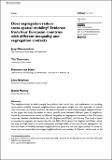Does segregation reduce socio-spatial mobility? Evidence from four European countries with different inequality and segregation contexts
Abstract
The neighbourhood in which people live reflects their social class and preferences, so studying socio-spatial mobility between neighbourhood types gives insight in the openness of spatial classs tructures of societies and in the ability of people to leave disadvantaged neighbourhoods. In this paper we study the extent to which people move between different types of neighbourhoods by socio-economic status in different inequality and segregation contexts in four European countries: Sweden, the Netherlands, the United Kingdom (England and Wales), and Estonia. The study is based on population registers and census data for the 2001-2011 period. For England and Wales, which has long had high levels of income inequalities and high levels of socio-economic segregation, we find that levels of mobility between neighbourhood types are low and opportunities to move to more socio-economically advantaged neighbourhoods are modest. In Estonia, which used to be one of the most equal and least segregated countries in Europe, and now is one of the most unequal countries, we find high levels of mobility, but these reproduce segregation patterns and it is difficult to move to less deprived neighbourhoods for those in the most deprived neighbourhoods. In the Netherlands and Sweden, where income inequalities are the smallest, it is the easiest to move from the most deprived to less deprived neighbourhoods. The conclusion is that the combination of high levels of income inequalities and high levels of spatial segregation tend to lead to a vicious circle of segregation for low income groups, where it is difficult to undertake upward socio-spatial mobility.
Citation
Nieuwenhuis , J , Tammaru , T , Van Ham , M , Hedman , L & Manley , D 2020 , ' Does segregation reduce socio-spatial mobility? Evidence from four European countries with different inequality and segregation contexts ' , Urban Studies , vol. 57 , no. 1 , pp. 176-197 . https://doi.org/10.1177/0042098018807628
Publication
Urban Studies
Status
Peer reviewed
ISSN
0042-0980Type
Journal article
Collections
Items in the St Andrews Research Repository are protected by copyright, with all rights reserved, unless otherwise indicated.

